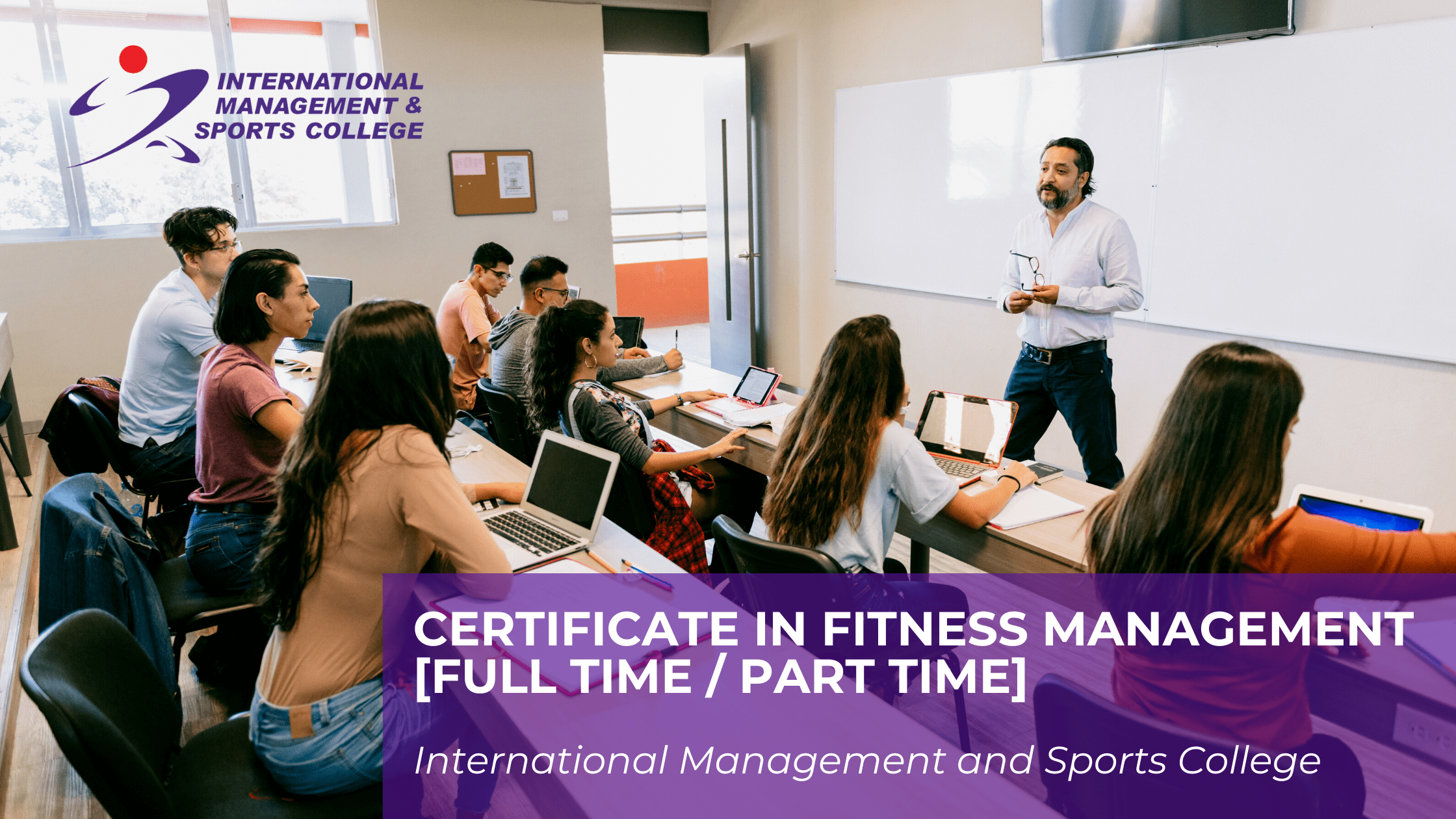What Are Your Options After ‘N’ level
There are numerous pathways open to you now that you have your N-levels results. There are programs that provide alternative routes for N-level students to enter Polytechnic. This is a substitute for moving on to Secondary 5 and taking the O-levels.
1. Study at a Private Diploma
Most people choose to pursue further education at the private institutions even when they were to take poly courses. Others find specialized work options, while others find none at all.
This choice can be the most suitable for you if you have the necessary resources, are confident that private diploma courses can benefit you, and are willing to do more independent study.
Pursuing a diploma at a specialised college like International Management and Sports College (IMSC) could be most beneficial for you as you would be able to pick up valuable skills / training that would allow you to fit right in with your chosen industry as soon as possible! You will be surprised that this would also be a highly cost effective option for you!
Joining a specialised college like IMSC could also provide a strong head-start for you by taking advantage of the strong network of industry partners that private education institutions like IMSC possess.
Our College welcome students from ALL walks of life! Be it Normal (Technical) Students or Normal (Academic) Students, all the way to mature candidates, we have options for you!
View our courses here.
Courses available for ‘N’ level Graduates at International Management and Sports College (IMSC):
– Diploma in Sports Science and Coaching
2. Proceed to Sec 5 (‘O’ Levels) – Normal (Academic) Students
N(A) students must receive less than 19 points in Math, English, and three additional subjects in order to be eligible for this level (EMB3). Additionally, you must possess a Grade 5 in each of the five subjects. What options are available to you with these grades? The same school where you previously attended may be where you take your O levels.
Courses available for ‘O’ level Graduates at International Management and Sports College (IMSC):
– Certificate in Fitness Management
– Diploma in Sports Science and Coaching
– International Sports Diploma in Sports and Exercise Science
3. Direct-Entry Scheme to Polytechnic Programme (DPP) – Normal (Academic) Students
DPP allow N(A) students to take a two-year Higher Nitec course at the ITE as an alternative to Secondary 5. If you successfully complete the course with the minimum grade-point-average (GPA), you will be admitted to the first or second year of a related polytechnic diploma programme.
DPP eligibility is based on students’ N-Level aggregate score.
Courses available for ITE Graduates at International Management and Sports College (IMSC):
– Certificate in Fitness Management
– Diploma in Sports Science and Coaching
– International Sports Diploma in Sports and Exercise Science
4. Polytechnic Foundation Programme (PFP) – Normal (Academic) Students
PFP is a one-year programme taught at polytechnics, as an alternative to Secondary 5. If N(A) students pass all their PFP modules, you will be admitted to a polytechnic diploma programme.
PFP eligibility is based on students’ N-Level aggregate score.
Courses available for Polytechnic Diploma Graduates at International Management and Sports College (IMSC):
– Certificate in Fitness Management
– Diploma in Sports Science and Coaching
– International Sports Diploma in Sports and Exercise Science
– Diploma in Sports Science and Management
– Diploma of Higher Education in Sport and Exercise Science (See course for exact entry requirements)
– Bachelor of Science in Sport and Exercise Science (See course for exact entry requirements)
– Bachelor of Science in Sport Management (See course for exact entry requirements)
The Differences Between PFP and DPP
The only way for students to guarantee a spot in a polytechnic back in the day was to continue on to Secondary 5 whenever they could. But this has changed.
Today, most of the assignments are done in class. Students also get to complete more practical projects like coding and router configuration.
Polytechnic Foundation Programme (PFP)
The Polytechnic Foundation Programme (PFP) is a diploma-specific foundation programme that is one of the two through-train pathways to polytechnics for Normal (Academic). It aims to prepare well-performing Sec 4 N(A) students for progression into selected polytechnic diploma courses. The programme is conducted over 2 academic semesters at the polytechnics and serves as an alternative to Sec 5.
Students are given provisional places in diploma programmes if they pass all modules in the PFP.
You will need a gross ELMAB3 score of 12 points or less, excluding CCA bonus points, for the N-Level examinations. There will also be specific requirements based on your preferred courses.
Direct-Entry-Scheme to Polytechnic Programme (DPP)
Students who did well on the GCE “N” (Academic) Level examination and who would like to acquire more practical training at ITE may first enroll in a 2-year Higher Nitec study there. In the event that you complete your 2-year Higher Nitec course with a qualifying Grade Point Average (GPA), you will thereafter be guaranteed a spot in a related polytechnic course.
The DPP exclusively accepts Sec 4 ‘N’ (Academic) students from the previous cohort, hence only results from Sec 4 ‘N’ (Academic) students who took the GCE ‘N’ Level exams in 2022 will be taken into consideration for admission to the DPP 2023 intake.
Secondary 4 ‘N’ (Academic) students may apply for the Direct Entry Scheme to Polytechnic Program (DPP) based on their GCE ‘N’ (Academic) Level final examination results and school-based ‘O’ Level preliminary examination results after the announcement of the GCE ‘N’ (Academic) Level results (if applicable). In order to apply for the DPP, students can also combine their GCE “N” (Academic) Level scores with their school-based “O” Level preliminary examination results. After enrolling in ITE for a 10-week preparation course in January 2023, successful students will begin the 2-year Higher Nitec program in April 2023.
Moving Forward To Higher Nitec
The majority of students who are enrolled in the DPP scheme AND have finished the program obtain a Higher Nitec, according to MOE. When they have completed their course and performed well, many students enrolled in the Polytechnic Foundation Programme (PFP) scheme will also transition to polytechnic institutions.
Students who struggle in the Polytechnic Foundation Programme (PFP) are not allowed to take the course again. They may, however, submit an application for ITE’s Higher Nitec programmes. They can choose to take the O-level exams as private candidates or they can contact their prior secondary schools to request readmission for the following year.
Most Polytechnic Foundation Programme (PFP) students will have performed better than their O-level contemporaries in most cases. To help students manage their studies, the school has implemented a number of strategies. These steps entail giving them remedial lectures and assigning mentors who will provide guidance in the PFP classes.
For options under the Normal (Technical) route, please refer here.
References:
– https://www.moe.gov.sg/post-secondary/admissions/pfp
– https://www.ite.edu.sg/admissions/full-time-courses/higher-nitec-dpp
– https://www.moe.gov.sg/secondary/courses/normal-academic
– https://www.moe.gov.sg/secondary/courses/normal-technical
– https://pfp.polytechnic.edu.sg/PFP/pfp_eligibility.html







